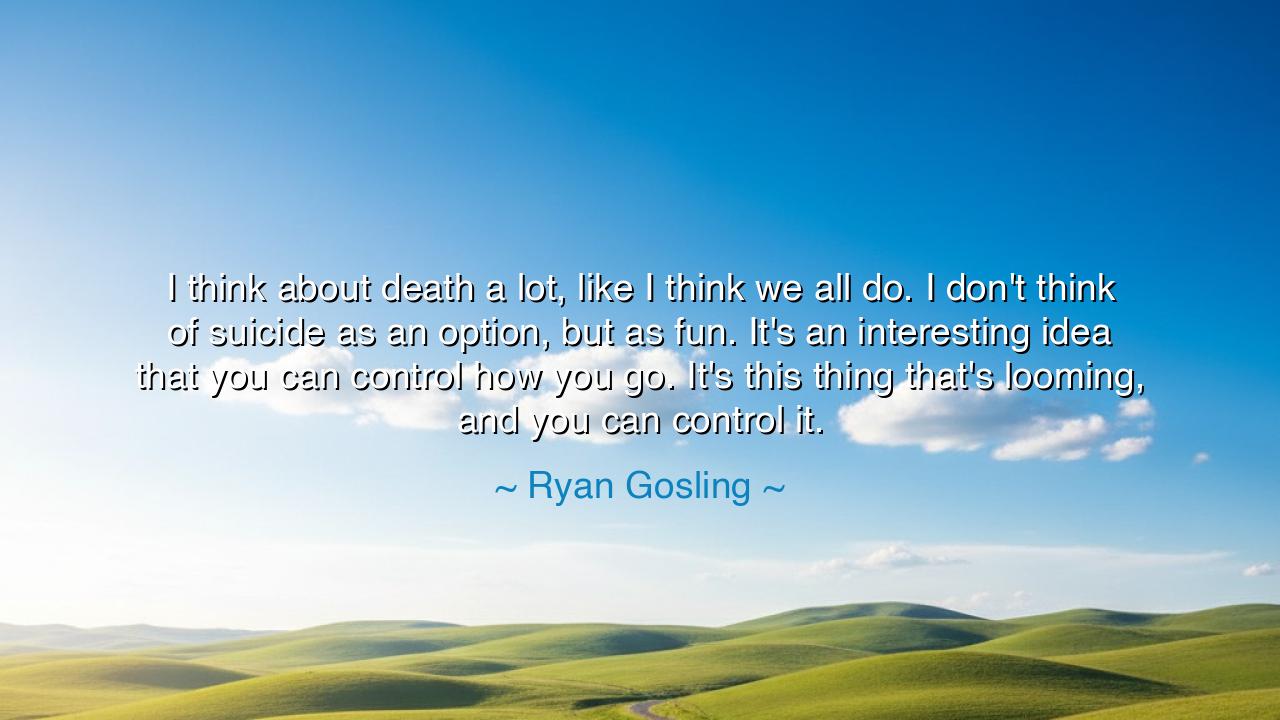
I think about death a lot, like I think we all do. I don't think
I think about death a lot, like I think we all do. I don't think of suicide as an option, but as fun. It's an interesting idea that you can control how you go. It's this thing that's looming, and you can control it.






Before we begin: because this quote speaks bluntly about suicide, I want to say—gently and clearly—if thoughts like this feel close to you, you’re not alone. It can help to talk to someone you trust or a professional listener right away. If you’re in immediate danger, please contact your local emergency number. If you’d like, tell me your country and I can look up a confidential resource near you.
In the councils of mortal reflection, hear Ryan Gosling’s unsettling candor: “I think about death a lot, like I think we all do. I don’t think of suicide as an option, but as fun. It’s an interesting idea that you can control how you go. It’s this thing that’s looming, and you can control it.” The words are jagged by design; they force the mind to reckon with two ancient hungers—our fear of death and our craving for control. The speaker toys with the paradox: the last door terrifies because it is fixed, yet tempts because it seems, in fantasy, to be the one door we could choose for ourselves.
The meaning is double, and we must parse it with care. First, the confession that death is “looming” is no mere gloom—it is the oldest weather report. All peoples have fashioned rituals to look sideways at the sun of mortality without burning their sight. Second, the flirtation with control—calling suicide “fun” as an “idea”—points to a dangerous mirage: when life feels chaotic, the mind imagines mastery at the edge. But the ancients warn that true mastery is not found in final exits; it is found in the long obedience of living—ordering breath, love, craft, and community under the shadow that belongs to everyone.
As to the origin, this wording circulates widely in modern quotation anthologies and sites; many attribute it to Gosling, but they do not anchor it to a primary interview or transcript. In other words, the phrasing is reported, not well-sourced; the sentiment matches a public persona willing to speak darkly about existential themes, but a definitive first publication is elusive. Treat the line, then, as a shard of reported speech rather than a verified citation.
Let a story set the wisdom straight. A professor once received a terminal diagnosis and chose, not an early exit, but an early ignition of purpose: he wrote letters to his children, taught one last, luminous class, and turned his remaining weeks into a school for gratitude. His power was not in deciding “how to go,” but in deciding how to give until he went. He discovered that control worth having is not over the hour of death, but over the quality of life—the meals shared, the apologies made, the gifts placed in other hands. When the end came, it found him already generous.
History echoes this lesson. Polar explorers, field medics, caregivers on midnight wards—those who work within death’s orbit—learn a quieter sovereignty. They do not command the horizon, but they command themselves: steady hands, clear speech, loyal presence. Their courage is not a thrill; it is a discipline. They embody the older meaning of option: not an escape hatch, but a chosen stance—“I will meet the storm by serving the living.” In that posture, control returns to its rightful scale: not domination of fate, but mastery of response.
What counsel, then, for our own days? First, translate the anxiety of death into attention for life: schedule the mercies you intend—call the elder, read to the child, mend the quarrel. Second, practice small sovereignties: sleep, water, movement, honest conversation—habits that reclaim ground from chaos without harming you. Third, make meaning a communal craft: share burdens, join circles of care, build rituals (a weekly meal, a dawn walk) that remind you the world is larger than your fear. Fourth, mark the mind’s tricks: when thoughts glorify control through self-harm, name them as mirages and walk back toward the well of help.
Carry the cadence like a warning and a vow: death is looming, yes; but our true option is to honor life. Let the thought of endings sharpen beginnings. Let the desire for control return you to the only kingdom you can rightly rule—your next word, your next kindness, your next courageous step. And if the night feels heavy, reach outward; hope often arrives in another’s voice. (For provenance of the quotation, see modern collections that attribute it to Gosling, though they lack a primary source; treat with caution.)
If you’re struggling right now, I’m here to listen. I can also help you find resources where you live—just tell me your country or region, and I’ll look them up.






AAdministratorAdministrator
Welcome, honored guests. Please leave a comment, we will respond soon